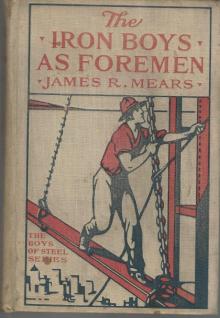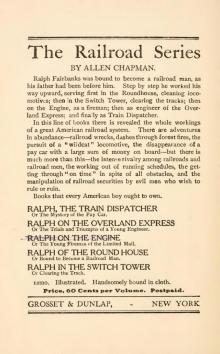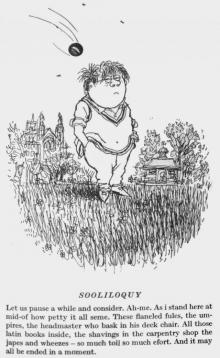- Home
- Mrs. Molesworth
The Third Miss St Quentin Page 8
The Third Miss St Quentin Read online
Page 8
himself what he thinks. But as for AuntPhillis--I am sorry if I have grieved her. I would not have done so ifI could have helped it, but I don't see that I could. It isn't my faultthat she is going to marry a vulgar, purse-proud old snob, who hadalready begun to cast up to me, yes, actually to cast up to _me_, thedaughter of Colonel St Quentin of Coombesthorpe, what his wife-to-be haddone for me and spent on me as if I were a charity-child! And thattouches on the point of the whole. I am grateful to poor auntie for allher love and care," and here the young, excited voice quivered a little,"but I don't see that I need to be grateful to her for what you may callsubstantial things--she didn't _need_ to give me a home, as you say, orto spend her money on me--and a good deal of what was spent was my ownmoney, or at least papa's, which is the same thing; she has told me soherself. I had my own home, just as you and Ermine have--I am papa'sdaughter just as much as you two are, even though we hadn't the samemother. Do you think now--in the name of common-sense--do you see thatI should be grateful for being taken away from my own proper home, sucha home as _this_--for no reason at all that I can see except that auntieherself wished it."
Madelene's face looked unspeakably pained.
"It was your own mother's wish," she said, in a low voice.
"So I have been told--but--do you think dead people's wishes should beallowed to affect the welfare of the living to such an extent?" askedthe child in her sharp downright fashion. "For I don't. Still that'snot the point--it was done and we'll take it for granted it was done forthe best. But now it was coming to an end--old Burton wasn't going tohave any trouble about me--he's never been asked and never will be tospend a penny upon me, except once when he paid a fly for me andquarrelled with the driver, and on my last birthday when he gave me a_very_ shabby prayer-book--sham ivory backs, you know, the kind thatsplits off--and it was auntie's own doing, so I _don't_ see that I couldhave been expected to put up with his rudeness."
"Had you done anything to irritate him?" asked Madelene.
Ella opened her eyes in surprise.
"Oh dear, yes," she said, "heaps of things. I don't suppose I ever didanything but irritate him. My very existence, at least my presence, inauntie's household irritated him. I understand it all now," she wenton, speaking more and more naturally with the interest of the subject."Don't you see he didn't know anything about us when he first madeauntie's acquaintance and began to think she'd just suit him for a wife,and he thought I was a homeless orphan, a poor dependent, and that he'dhave to take me too. It was rather irritating, I'll allow," shecontinued, smiling to herself a little, "for he saw we'd never get on,and if he'd only been a little nicer when he found I wasn't in his way,after all, we might have `parted friendly,' as servants say. But he wasthoroughly put out by me--I _couldn't_ help trying to annoy him. Andlast night it came to a sort of crisis--he said I was impertinent andother things he had no business to say to papa's daughter, who is norelation of _his_, and at last he told auntie, poor auntie, that shemust choose between him and me."
"And what did Mrs Robertson say?" asked Madelene.
"She didn't say much. Indeed I didn't give her any opportunity. Shehad a headache this morning, no wonder, and didn't come down. So I justpacked up a few things and told the servants to say I'd gone out, and Iwent to the railway and--came off here. _Naturally_ I came here," sherepeated, her tone acquiring again a shade of defiance, in reality theveil of some unacknowledged misgiving.
Madelene did not at once reply. She sat there, her eyes gazing out ofthe window before her, in what Ella thought a very aggravating way.
"Do you not agree with me?" the younger sister asked after a moment'ssilence. Shyness was unknown to Ella, as were hesitation and patiencewhen she was much concerned about anything.
Madelene turned round and looked at her.
"She's angry," thought Ella. "It is not any other feeling that makesher look like that." And she kept her own bright eyes fixed upon hersister, which did not add to Miss St Quentin's composure.
"Of course if you were obliged to go _anywhere_ in this--this strangesort of way, you did right to come here," said Madelene quietly. "Butthat is not the question at all. Were you right to leave your aunt'shouse as you have done? That is the thing."
"Yes," said Ella coolly, "under the circumstances I think I was quiteright."
"Without consulting papa, without talking it over with Mrs Robertson,without--without," Miss St Quentin went on, a sudden sensation ofsomething very like temper nerving her to say it--"without in the leastconsidering our--Ermine's and my--convenience?"
Ella gazed at her in unfeigned surprise, for a moment or two she was tooastonished to feel indignant.
"I don't understand you," she said. "Is it usual for sisters to be uponsuch terms? Is a daughter expected to beg and apologise like astranger, before getting leave to come home--home where she has a rightto be, and from which she was banished without her wishes beingconsulted in the least?"
"You were a baby," said Madelene. "You could not have been consulted.And--well the thing was done and this has _not_ been your home, and itis no use talking in that exaggerated, theatrical sort of way, Ella. Ishall do my best, my very best," and here there was a little tremor inher voice, "to make you happy and content with us, and so I know willErmine, but I can't say that in what you have done to-day I think youhave acted wisely, or--or rightly. What papa will say about it I don'tknow. I--I did not mean to put forward any inconvenience to myself, orourselves, in any prominent way."
She had already regretted the allusion to her sister and herself thatshe had made. It was, she felt, both unwise and inconsistent with theresolution she had come to.
Ella did not answer.
"Will you come out for a little?" Madelene went on. "We have beenhaving tea--Ermine and I and--and our cousin--on the lawn. You wouldlike a cup of tea, would you not? I am afraid your room will not beready yet. We have been making some changes, and the rooms we intendfor you are to be papered and painted next week. In the meantime wemust consider how best to arrange."
"I am sorry to give you so much trouble," said Ella coldly. "I shouldhave thought--it surely cannot be difficult for the third daughter tohave a room just as you and Ermine have. But of course you are right--I_am_ a stranger, and it is no good pretending I am not."
"That was not what I meant at all," said Madelene. But again Ella madeno reply.
"I must take care what I say," she was thinking to herself, "or I shallbe called `exaggerated' and `theatrical,' again."
Madelene opened the window and stepped out. "Shall we go this way?" shesaid. "It is nearer than round by the front door."
Ella followed her.
"I am to be a younger sister when it comes to questions of precedenceand that kind of thing, it appears," she thought. "But a stranger whenit suits the rest of the family to consider me so."
There was something soothing however to her impressionable feelings inthe beauty all around her; it was a really exquisite evening and thegirl was quick to respond to all such influences.
"How lovely!" she said impulsively.
Madelene turned. There was a smile on her face, almost the first Ellahad seen there; the quiet, somewhat impassive countenance seemedtransfigured.
"Yes," she said, "it _is_ lovely. I am glad for you to see it again forthe first time on a day like this, though to us, and I think you willagree with us when you have lived here long enough, Coombesthorpe has acharm of its own in every season."
Ella opened her lips to reply, but before she had time to do so, shecaught sight of a figure hastening towards them over the lawn.
"Oh," said Madelene, "here is Ermine. Yes! Ermie," she called out,before the new-comer was quite close to them, "it is she--it is reallyElla."
CHAPTER FOUR.
BACK IN THE NURSERY.
Ella's eyes rested on her second sister with admiration scarcely lessthan that which her first glance at Madelene had aroused.
"At least," she thought to hersel
f, for a moment throwing her prejudiceand irritation aside, "at least I have no reason to be anything but_proud_ of my belongings. They are both beautiful."
Ermine who was tall also, though an inch or two shorter than Madelene,stooped to kiss her. And her kiss seemed to Ella less cold than herelder sister's.
"I shall like her the best," she rapidly decided, for she was much givento rapid decisions.
"You have quite taken us by surprise, Ella," said Ermine, in a tonewhich told

 The Iron Boys as Foremen; or, Heading the Diamond Drill Shift
The Iron Boys as Foremen; or, Heading the Diamond Drill Shift An Enchanted Garden: Fairy Stories
An Enchanted Garden: Fairy Stories Grandmother Dear: A Book for Boys and Girls
Grandmother Dear: A Book for Boys and Girls Ralph, the Train Dispatcher; Or, The Mystery of the Pay Car
Ralph, the Train Dispatcher; Or, The Mystery of the Pay Car The Children of the Castle
The Children of the Castle The Magic Nuts
The Magic Nuts Uncanny Tales
Uncanny Tales Silverthorns
Silverthorns The Third Miss St Quentin
The Third Miss St Quentin Christmas-Tree Land
Christmas-Tree Land Philippa
Philippa Jasper
Jasper The Little Old Portrait
The Little Old Portrait Mary: A Nursery Story for Very Little Children
Mary: A Nursery Story for Very Little Children Us, An Old Fashioned Story
Us, An Old Fashioned Story The Constant Prince
The Constant Prince Blanche: A Story for Girls
Blanche: A Story for Girls The Cuckoo Clock
The Cuckoo Clock The Carved Lions
The Carved Lions Tell Me a Story
Tell Me a Story That Girl in Black; and, Bronzie
That Girl in Black; and, Bronzie Sweet Content
Sweet Content Boys and I: A Child's Story for Children
Boys and I: A Child's Story for Children The Man with the Pan-Pipes, and Other Stories
The Man with the Pan-Pipes, and Other Stories Bert Wilson's Fadeaway Ball
Bert Wilson's Fadeaway Ball Nurse Heatherdale's Story
Nurse Heatherdale's Story Adventures of Herr Baby
Adventures of Herr Baby Shaggycoat: The Biography of a Beaver
Shaggycoat: The Biography of a Beaver Adventures of Prince Lazybones, and Other Stories
Adventures of Prince Lazybones, and Other Stories Adventures of Piang the Moro Jungle Boy
Adventures of Piang the Moro Jungle Boy